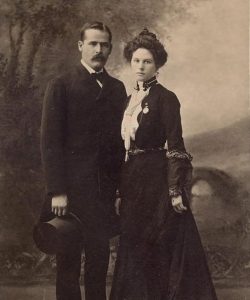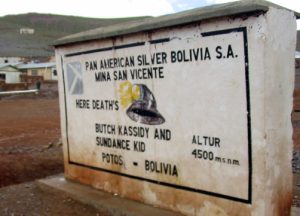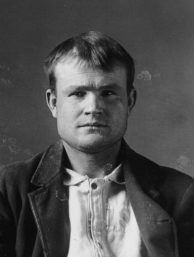bandits
 Over the years, many have speculated about the validity of the death of famous people, among them, Elvis Presley. For some unknown reason, people just cant believe, for whatever reason, that someone famous is dead. Butch Cassidy and the Sundance Kid were legendary outlaws who robbed trains, payroll couriers, and banks. When the law got too close to them, they took off for Bolivia. It wasn’t a plan that fared well…or was it? Robert Leroy Parker was born April 13, 1866, in Beaver, Utah. As a bandit, he used the alias Butch Cassidy. Harry Alonzo Longabaugh born in Mont Clare, Pennsylvania in 1867, was better known as Butch Cassidy’s sidekick and partner in crime, the Sundance Kid. The two of them had an illustrious criminal career, but as with all criminal careers, at some point mistakes are made, or they meet their match in a lawman who bests them, with a gun or their abilities as a detective. A part of the Wild Bunch, the careers of Butch Cassidy and the Sundance Kid were shrouded in mystery, but that mystery pales by comparison to their deaths. After making their escape to Argentina, and then to Bolivia, Cassidy, the Kid, and girlfriend, Etta Place thought that the small town of San Vicente would be an easy target for their crimes.
Over the years, many have speculated about the validity of the death of famous people, among them, Elvis Presley. For some unknown reason, people just cant believe, for whatever reason, that someone famous is dead. Butch Cassidy and the Sundance Kid were legendary outlaws who robbed trains, payroll couriers, and banks. When the law got too close to them, they took off for Bolivia. It wasn’t a plan that fared well…or was it? Robert Leroy Parker was born April 13, 1866, in Beaver, Utah. As a bandit, he used the alias Butch Cassidy. Harry Alonzo Longabaugh born in Mont Clare, Pennsylvania in 1867, was better known as Butch Cassidy’s sidekick and partner in crime, the Sundance Kid. The two of them had an illustrious criminal career, but as with all criminal careers, at some point mistakes are made, or they meet their match in a lawman who bests them, with a gun or their abilities as a detective. A part of the Wild Bunch, the careers of Butch Cassidy and the Sundance Kid were shrouded in mystery, but that mystery pales by comparison to their deaths. After making their escape to Argentina, and then to Bolivia, Cassidy, the Kid, and girlfriend, Etta Place thought that the small town of San Vicente would be an easy target for their crimes.
As courier for the Aramayo, Francke and Cia mining company, Carlos Pero was riding his mule up a rugged trail high in the Andes Mountains on the morning of November 4, 1908. He was completely unaware that his every move was being watched. Pero later said that after cresting a hill, he was “surprised by two Yankees, whose faces were covered with bandanas and whose rifles were cocked and ready to fire.” The pair of masked bandits robbed the courier of the company’s payroll and then disappeared into the desolation of southern Bolivia, but that was not to be the end of it. Three days later, four Bolivian officers cornered a pair of Americans suspected of being the bandits in a rented house, in the dusty village of San Vicente. The Pinkerton Detective Agency, which had long been trailing Butch Cassidy and the Sundance Kid, and had warned banks across South America to be on the lookout for them, because they had fled there from the United States in 1901. It was  reported that the two Americans holed up in San Vicente were them. As a Bolivian soldier approached the hideout, the Americans shot him dead. A brief exchange of gunfire ensued. When it was over, San Vicente mayor Cleto Bellot reported hearing “three screams of desperation” followed by two gunshots from inside the house. When the Bolivian authorities cautiously entered the hideout the following morning, they found the bodies of the two foreigners.
reported that the two Americans holed up in San Vicente were them. As a Bolivian soldier approached the hideout, the Americans shot him dead. A brief exchange of gunfire ensued. When it was over, San Vicente mayor Cleto Bellot reported hearing “three screams of desperation” followed by two gunshots from inside the house. When the Bolivian authorities cautiously entered the hideout the following morning, they found the bodies of the two foreigners.
For decades, Daniel Buck and Anne Meadows, husband and wife researchers scoured South American archives and police reports trying to track down the true story of what happened to Butch Cassidy and the Sundance Kid, a saga that Meadows detailed in her book “Digging up Butch and Sundance.” While the paper trail pointed to their deaths in Bolivia, conclusive evidence as to the identities of the bandits killed in San Vicente in November 1908 rested under the ground of the village’s cemetery. The researchers enlisted the help of Clyde Snow, the renowned forensic anthropologist who had conclusively identified the remains of Nazi war criminal Josef Mengele. They received permission from Bolivian authorities to exhume the robbers’ bodies. Guided to their purported grave by an elderly villager whose father had reportedly witnessed the shootout, they opened the graves in 1991. Inside they found a skeleton of one man, and a piece of a skull from another. After a detailed forensic analysis and a comparison of DNA to the relatives of Cassidy and Longabaugh, Snow found there was no match. The skeleton was instead likely to have been that of a German miner named Gustav Zimmer who had worked in the area. It’s possible that the bodies of the iconic outlaws remain buried elsewhere in the San Vicente cemetery or even elsewhere in the country, but with no conclusive proof as to the whereabouts of the bodies of Butch Cassidy and the Sundance Kid, their ultimate fate remains a mystery.

With no conclusive evidence to confirm the deaths of Butch Cassidy and the Sundance Kid, the rumors flew, that the pair had once again eluded the long arm of the law, and sightings of the duo in South America, Mexico and the United States continued for decades to come. Family members fueled the stories by insisting that the men had never been killed and instead returned to the United States to live into old age. Cassidy’s sister, Lula Parker Betenson, wrote in her 1975 book “Butch Cassidy, My Brother” that the outlaw had returned to the family ranch in Circleville, Utah, in 1925 to visit his ailing father and attend a family wedding. According to Betenson, Cassidy told the family that a friend of his had planted the story that one of the men killed in Bolivia was him so that he would no longer be pursued. She claimed that Cassidy lived in the state of Washington under an alias until his death in 1937. Betenson said her brother was buried in an unmarked grave in a location that was kept a family secret.

